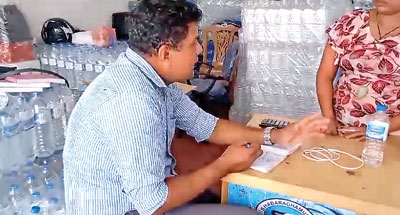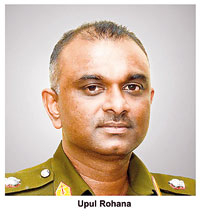News
Food adulteration on the rise the past five years
View(s):By D Thiviyatharshini
Food adulteration is becoming a national concern, with experts warning that it is escalating fast in Sri Lanka.
According to Dr. R. M. G. B. Rajanayake, former City Analyst of Colombo, 85 to 90% of commonly consumed food items are adulterated. Spices are among the food items most contaminated by hazardous additives. One of the most threatening of carcinogenic textile dyes, “Metanil yellow”, is heavily found in turmeric powder. Continuous consumption of this kind of toxic substances could lead to chronic diseases including cancer.

Raid by Consumer Affairs Authority
Turmeric and chili powder also often contain synthetic colouring agents and starch, while common salt is mixed excessively with chili powder and condiment mixes. High levels of salt pose a serious health risk for persons suffering from hypertension, said Dr. Rajanayake.
Ghee, an essential raw material in Ayurvedic medicine, is adulterated with low-cost vegetable oils which potentially degrade the medical value.
Dr. Rajanayake said that medically vulnerable people can be categorised into six groups, based on prolonged consumption and the immunity power of the individual. Infants form one group, the development of their endocrine and immune systems being interrupted by these adulterants. Colouring matter like tartrazine may be harmful to people who are suffering from wheezing and may cause acute effects.
Pregnant and lactating mothers are also affected, and elderly and sick people are vulnerable because of their low immune system. Furthermore, heavy metal contamination from elements like arsenic, lead, mercury, and cadmium can cause both acute and chronic health issues.
 Dr. Rajanayake advised consumers, particularly vulnerable individuals, to prioritise natural and unprocessed foods over highly processed and artificially coloured products. He also warned against frequently consuming grilled and barbecued meats, which may contain harmful toxicants.
Dr. Rajanayake advised consumers, particularly vulnerable individuals, to prioritise natural and unprocessed foods over highly processed and artificially coloured products. He also warned against frequently consuming grilled and barbecued meats, which may contain harmful toxicants.
“Food adulteration has escalated during the last five years due to the severe economic crisis”, said M. G. Upul Rohana, President of the Public Health Inspectors’ (PHI) Union.
He highlighted that food adulteration in Sri Lanka is caused primarily by business interest. Adulteration is carried out for financial gain, often by mixing expensive food items with cheaper substituents.
Examples include the mixing of palm oil with coconut oil, the use of flour in turmeric powder, papaya seeds in pepper, and sugar syrup in bee honey and kitul syrup.

Asela Bandara, CAA
PHIs conduct routine inspections, collecting approximately 10,000 samples monthly for laboratory testing. They adhere to the Food Act Amendment of 2008 and the SLS standards, especially the food regulation gazette, the first of which was issued in 1987.
Legal penalties for food adulteration remain relatively low, with fines ranging from Rs.500 to Rs.3,000. If a magistrate court confirms the presence of hazardous or carcinogenic substances, fines can increase to between Rs. 1,000 to Rs. 10,000. Repeat offenders risk losing their trading licence after three violations.
However, Sri Lanka faces significant challenges in identifying food adulterants due to a lack of advanced laboratory facilities, testing equipment, and trained personnel. Currently, PHIs rely on basic tools such as thermometers and iodine tests, whereas modern food testing requires sophisticated machinery to detect toxic substances like rhodamine blue and Metanil yellow.
He also stated that authorities have initiated legal proceedings against the traders involved, with fines ranging from Rs. 10,000 to Rs. 100,000 per violation for private companies and 1000 to 10,000 for the sole proprietorship. Additionally, a suspect attempting to distribute 3,000 kg of the confiscated stock was arrested. Asela Bandara said the CAA remains vigilant in its efforts to curb food adulteration and fraudulent market practices. Regular raids target key consumer protection concerns, including overpriced goods, expired products, misleading labelling, and hazardous food adulterants. Coconut oil and spices are among the most commonly adulterated items, often sent for laboratory analysis to determine necessary actions.
A press release on March 18, by the EU, the FAO & the Health Ministry says that in response to the escalating crisis, the European Union (EU), the Food and Agriculture Organization (FAO), and Sri Lanka’s Ministry of Health have joined forces to strengthen food safety control mechanisms. A high-level panel discussion, organised under the EU-funded BESPA Project, aims to enhance food safety regulations, increase public awareness, and provide financial and technical assistance to improve food safety infrastructure.
Dr. Nalinda Jayatissa, Minister of Health and Mass Media, reiterated the government’s commitment to strengthening food safety standards. He emphasised the importance of a multi-stakeholder approach involving government agencies, industry leaders, and the media to ensure consumer protection. FAO Representative Mr. Vimlendra Sharan stressed that food safety is not just a technical issue but requires collective action and increased public awareness to influence behaviours throughout the food value chain.
The best way to say that you found the home of your dreams is by finding it on Hitad.lk. We have listings for apartments for sale or rent in Sri Lanka, no matter what locale you're looking for! Whether you live in Colombo, Galle, Kandy, Matara, Jaffna and more - we've got them all!

